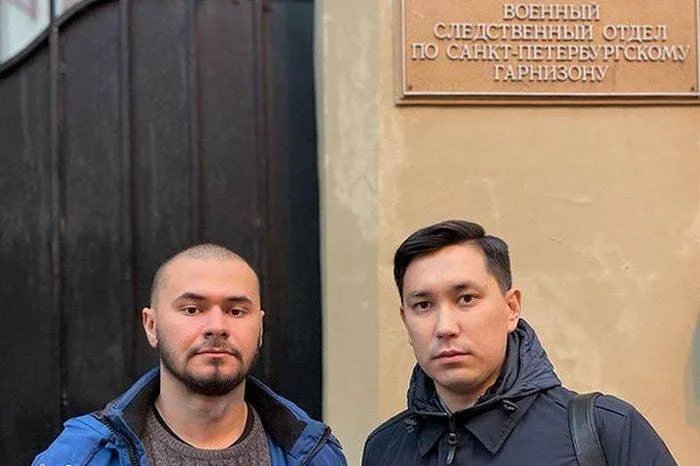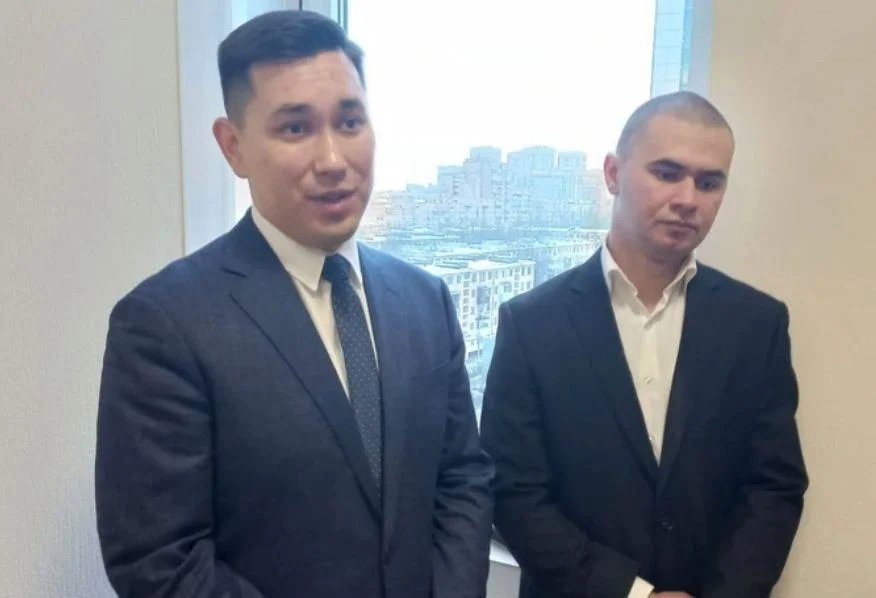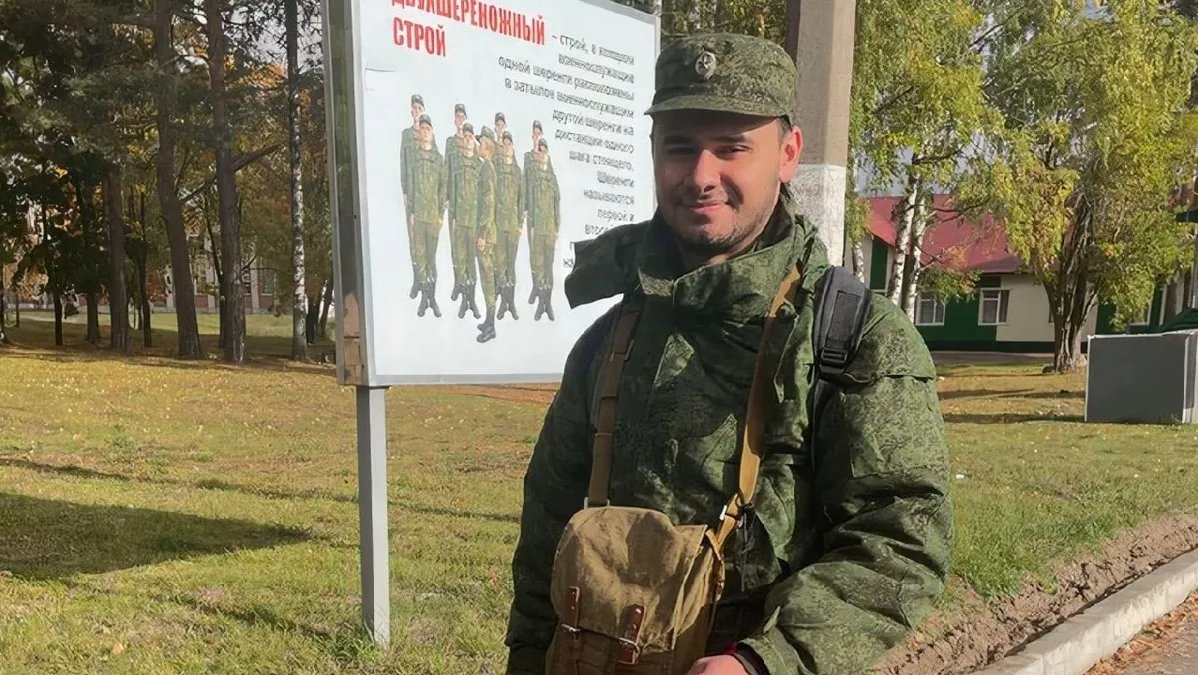The life of pacifist Kirill Berezin is in danger. The mobilised St. Petersburg resident, who keeps insisting on his right to be able to undergo alternative civilian service instead of the military one, despite losing two related lawsuits, is currently held at a military unit in the St. Petersburg region. There, other soldiers training for deployment to the area of the “special military operation” are threatening to “deal” with him.
“Every night when I fall asleep, I don’t know whether I’ll wake up in the morning,” Kirill confessed to his relatives. There are plans to transfer Kirill to a military unit near the city of Belgorod in the next few days; the commander of the Belgorod unit vowed Kirill would meet the same fate there: he will be driven into the forest, murdered, and buried so deep no one will ever be able to find his body.
Kirill Berezin, 27, was drafted during the first days of mobilisation: the St. Petersburg resident, who underwent compulsory military service eight years ago, received a draft notice on 24 September.
He was asked to come into the draft office to, allegedly, clarify some data related to his documentation. Kirill, as a law-abiding citizen, went there immediately. But no one had any plans for any clarification of any data. In the draft office, his passport was seized, while Kirill himself was sent to go home to pick up his military ID. When he returned with the military ID, it also was seized.
Kirill is a deeply religious man, and his beliefs prohibit him from taking a weapon into his hands. He declared what his views were from the start and kept insisting on undergoing alternative civilian service instead.
However, the employees of the draft office misled Kirill. They promised him that he would not be deployed anywhere, seeing as, in addition to everything else, he takes care of his elderly grandmother: “You’ll remain here, to serve in the territorial defence forces of the St. Petersburg region, your task will be ensuring order in the region, and you will be able to go home on the weekends.” (Berezin is an orphan, his only living relative is his grandmother who is incapable of taking care of herself).
Nevertheless, on the same day, Kirill was transported to the Kamenka unit with other mobilised men, for military training. He stayed there until 28 September.
“Their military training took only five days,” Marin Tsiganova, Berezin’s close friend, says. “Kirill fired 30 shots — that’s nothing. Then, the training was over, and all draftees were transferred to the Belgorod region. In the early hours of 1 October, they were placed in a campground near the Khokhlovo village.”
Back in the Kaminka unit, Kirill wrote a report asking to undergo alternative civilian service instead. But he did not find any commander that he could hand the report to. Upon arriving in Khokhlovo, he tried to submit a report, again. He was unsuccessful, again.
“The chief of staff of the military unit, Anatoly Smerdov, had a very negative reaction,” Marina says. “Without letting Kirill finish talking, he started swearing: ‘Why would you, bitch (he only refers to my friend as ‘bitch’ and ‘maggot’), continue living? Good guys will die, and you’ll live?’ Smerdov left his report on the table and left. He did not sign Kirill’s copy.”
Berezin took a photo of the copies and sent them together with the original report to Tsiganova. She sent these documents, including Kirill’s report asking to be transferred to alternative civilian service and his complaint, to all responsible authorities: to the Office of the Commissioner for Human Rights, to the Military Prosecutor’s Office, to the Investigative Committee.
Furthermore, she filed a lawsuit on behalf of Kirill to the St. Petersburg Nevsky District Court. On 18 October, the court rejected Kirill Berezin’s request to be transferred to alternative civilian service, basing its decision on the fact that alternative civilian service is not stipulated by the law during mobilisation. The court ignored the plaintiff’s constitutional rights, so Kirill appealed against the decision in a higher court — the St. Petersburg City Court.

Kirill Berezin and his lawyer Nikifor Ivanov. Photo from a personal archive
While the court proceedings were happening, Kirill, back then still stationed in the Belgorod region, constantly complained to his friends and relatives about the threats he was receiving from the chief of staff of the military unit, Anatoly Smerdov.
On 21 October, Kirill, unable to withstand the mental pressure, wrote a goodbye note and tried to kill himself. His suicide attempt failed.
Then, Berezin decided to go AWOL. On 25 October, Kirill fled from the Belgorod region campground in a taxi. The only things he took with him were his passport and military ID. It took him 22 hours to reach St. Petersburg; he went to the local Investigative Committee at once and wrote a confession (according to the article of the Russian Criminal Code on “Going AWOL”, if a soldier is not present at the military unit for less than 48 hours, then he cannot be criminally charged) and a complaint about the threats received from Anatoly Smerdov.
Two inquiries were launched: the first into Smerdov’s behaviour and the second into Kirill’s going AWOL. While the inquiries were being carried out, Kirill was seconded to a local St. Petersburg military unit.
On 29 November, the St. Petersburg City Court considered Kirill’s appeal against the decision taken by the district court. This time, however, the pacifist was allowed to take the stand and speak for himself.
“When I was undergoing compulsory military service, I went to the training grounds once — to fire at targets, and then I realised that I’m not capable of shooting a person. In general, nothing good comes from a rifle, except destruction. When it comes down to it, it’s a murder weapon, that’s its only use.”
Kirill added that he is scared of blood, and the most important thing — he was raised a Christian, he regularly goes to church, he prays; army service contradicts his way of life, he does not want to “shoot, murder, and put his life in danger”.
According to Kirill’s friends who were present at the court hearing, the judge listened to him with reluctance — she kept interrupting him and asking unrelated questions.
The draft office representative objected to Kirill’s stance: “The army doesn’t teach to kill but to protect one’s Homeland.”
In the end, the city court did not grant Kirill’s appeal, summarising it this way: according to the law “On military duty and service”, only conscripts younger than 27 years old are entitled to undergo alternative civilian service, while mobilised servicemen have no right to replace military service with alternative one.
The higher court’s decision entered into effect immediately, despite the fact that Kirill is planning to appeal it in the Supreme Court of Russia.
On 29 November, Kirill was taken directly from the city court to the Kamenka military unit where, according to his friends, his freedom was restricted and his every move is monitored.
“He’s not allowed to leave the unit’s territory. He’s guarded very well. They monitor him so he has no opportunity to talk to journalists,” Matina Tsiganova explains. “They took the door off in the orlop where he sleeps. They turned off power in the room. He has nowhere to charge his phone. We were warned that at any moment he could be deployed to the ‘special operation’ area. They were getting ready to send him there on 3 December, but we were able to get an extension. The next deployment from the Kamenka unit will take place on 6-7 December. The hearing of the Supreme Court on Kirill’s complaint will, of course, take place long after that date.”

Kirill Berezin and his lawyer Nikifor Ivanov. Photo from a personal archive
Meanwhile, on 30 November, a court in the St. Petersburg region tried a similar case and, for the first time in Russia’s history, deemed illegal the mobilisation of a man who had been insisting on undergoing alternative civilian service.
Pavel Mushumansky, 23, received a draft notice on 24 September, just like Kirill did. Pavel came to the draft office and asked to undergo alternative civilian service, seeing as military service is against his beliefs.
The young man emphasised the fact that in 2019-2021 he had already undergone alternative civilian service instead of the compulsory military one — he worked at the local psycho-neurological boarding school. However, Mushumansky’s reasoning went ignored in the draft office, and he was mobilised. On 7 October, his representatives filed a lawsuit on recognising his mobilisation illegal. On 20 October, the court suspended the decision on his mobilisation; on 30 November, it got basically annulled.
“Mushumansky and Berezin have different factual backgrounds. Unlike Mushumansky, Berezin previously served in the army, while Mushumansky underwent alternative service specifically,” Mushumansky’s lawyer, the St. Petersburg Lawyer Chamber member Alexander Peredruk explains.
“In Mushumansky’s case, his pacifist and religious beliefs, which would come into conflict with serving in the army, could not be negated even by the defendants.
“That is because the state, represented by the draft commission, had previously recognised Mushumansky’s right to alternative service. In Kirill Berezin’s case, he has to prove when, how, and why his beliefs were formed. While the draft commission has to study these reasons in detail, which did not happen in his case. No one actually investigated Berezin’s beliefs. Everyone just referred to there not being a legislative norm. But that is a mistake of a law student failing all his classes.”
“Many think that basing your arguments on the Constitution is improper. I wholly disagree. On the contrary, I think it’s amateur to pretend the Constitution doesn’t exist. In general, we can only refer to the Constitution nowadays, especially when a law is written badly or it doesn’t exist at all,” Peredruk adds.
“The judges might even believe that Kirill holds these beliefs. But it’s easier for them to hide behind the claim that there’s no federal law regulating undergoing alternative civilian service during mobilisation, so they reject the plaintiff’s plea,” Kirill’s lawyer Nikifor Ivanov comments. “Nevertheless, this doesn’t negate a person’s constitutional rights, which is something I made a note of during the court proceedings both times, and which we will be proving in the future in the Supreme Court.”
Join us in rebuilding Novaya Gazeta Europe
The Russian government has banned independent media. We were forced to leave our country in order to keep doing our job, telling our readers about what is going on Russia, Ukraine and Europe.
We will continue fighting against warfare and dictatorship. We believe that freedom of speech is the most efficient antidote against tyranny. Support us financially to help us fight for peace and freedom.
By clicking the Support button, you agree to the processing of your personal data.
To cancel a regular donation, please write to [email protected]

